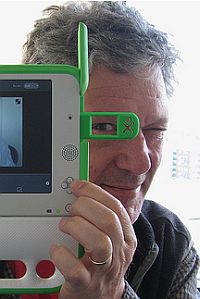Michael Trucano, a recognized expert on deploying ICT in education, recently blogged about Worst practice in ICT use in education:
Here's a list of some of what I consider to be the preeminent 'worst practices' related to the large scale use of ICTs in education in developing countries, based on first hand observation over the past dozen or so years. I have omitted names (please feel free to fill them in yourself). The criterion I used for selection was simple: The given worst practice was easily observable in multiple prominent initiatives, with (one fears) a high likelihood of re-occurrence, in the same or other places.
As one of his humble understudies in ICT4E, I found myself in agreement - these are worst practices that are repeated again, and again, and again, when technology and schools are mixed. I've also seen these practices in multiple OLPC deployments.
In fact, I started OLPC News exactly four years ago because I saw OLPC itself espousing many of these worst practices as core aspects of its deployment methodology.
Yet, not all OLPC deployments have committed these sins against common sense. To prove it, Walter Bender has rebutted each worst practice per the Plan Ceibal and Paraguay Educa deployments:
- Dump hardware in schools, hope for magic to happen.
Far from it, there have been extensive support mechanisms in place in .ur and .py from Day One - Design for OECD learning environments, implement elsewhere.
While there is some sharing of content and best practice, it is the local pedagogical team that calls the shots in both deployments. - Think about educational content only after you have rolled out your hardware
Again, pedagogy has driven the pace of deployment. At the same time, the entire deployment has been thought of within the context of a learning platform, which includes laptops, connectivity, servers, training, content development, documentation, support, community outreach, etc. - Assume you can just import content from somewhere else
The key here is "just". Both .uy and .py think deeply about content, but they are also opportunistic - taking advantage of great content developed elsewhere, for example, by the Etoys community. - Don't monitor, don't evaluate
At Ceibal, they have an extensive operation for monitoring the state of the network, servers, and laptops within their deployment. There are numerous ongoing evaluations of the program, both internal and external. Paraguay Educa was the subject of an external evaluation by the IADB, which issued a very positive report. - Make a big bet on an unproven technology (especially one based on a closed/proprietary standard) or single vendor, don't plan for how to avoid 'lock-in
Both programs have used a open bidding process and have some percentage of hardware from multiple vendors. Both programs use Free Software. - Don't think about (or acknowledge) total cost of ownership/operation issues or calculations
.uy has been diligent in publishing their total-cost-of-ownership numbers - these numbers, based upon the costs measured in the field happen to be much less than the inflated numbers fabricated by naysayers. - Assume away equity issues
While no one is claiming that equity issues are no longer a concern, the fact that the per-household penetration of computing in .uy is inversely proportional to household income says a lot. And in every one of these households, the children have free Internet access. Wow. - Don't train your teachers (nor your school headmasters, for that matter)
The biggest investment in the .py program has been in teacher training. As the project scales, finding ways to make this process more efficient will be key. But no one has every suggested that it was not a vital part of the process.



Yes, it's true. OLPC is the worst educational program in the world--except for all the others that have been tried from time to time.
This silliness reminds me of the second clinical trial of orange juice for treating scurvy in the British Navy. The first was a huge success. The Navy Captain who organized the second trial ordered the orange juice boiled down to "concentrate the active ingredient", thus destroying all of the vitamin C. Anti-scorbutic (anti-scurvy) or ascorbic acid, as we now know it. Then when the boiled juice had no effect, he denounced the whole idea, holding back adoption for most of the next decade.
There are lots of people in education schools who know how to design experiments correctly so that the results are not completely meaningless. (Disclosure: My mother was one of them.) Perhaps we should talk with them.
"Again, pedagogy has driven the pace of deployment."
Patently false.
Most of the other "rebuttals" are equally bogus and undeserving of serious discussion.
Wayan,
Thanks for your kind words above. I hope it doesn't appear too ungrateful to say so, but I think the headline here is a little misleading.
A 'rebuttal' implies that someone or some group was accused of something -- a rebuttal is then a response refuting such claims.
I tried to be very clear by stating that each 'worst practice was easily observable in multiple prominent initiatives'.
In fact, I never referenced *any* specific groups or initiatives when offering my opinions on what some 'worst practices' are.
Echoing Edward's comment, I think doing so would be 'silliness -- or at least be counterproductive.
It has been interesting to see how the original blog post has seemed to take on a life of its own, interpreted (and mis-interpreted) in various ways, in various contexts, to various ends.
Thanks for giving the original post some additional exposure here -- I know a lot of people visit this web site not just for news/opinion/arguments about OLPC, but also for broader coverage of education technology issues as well.
Cheers,
Mike